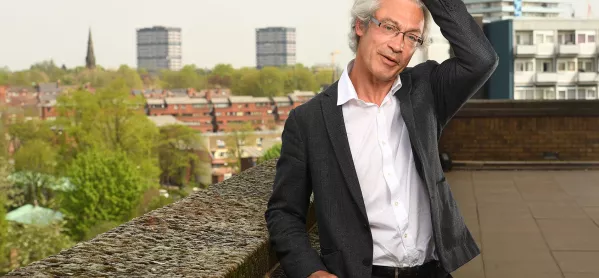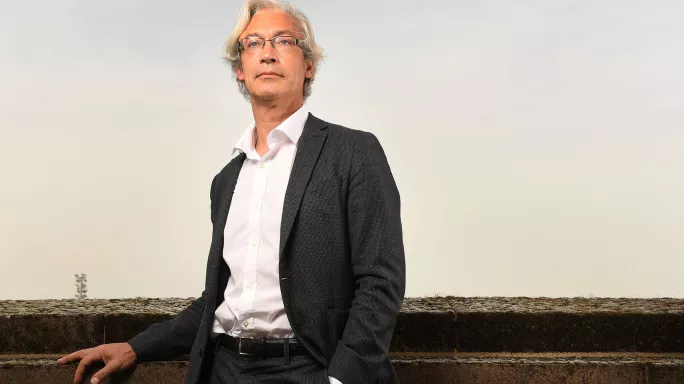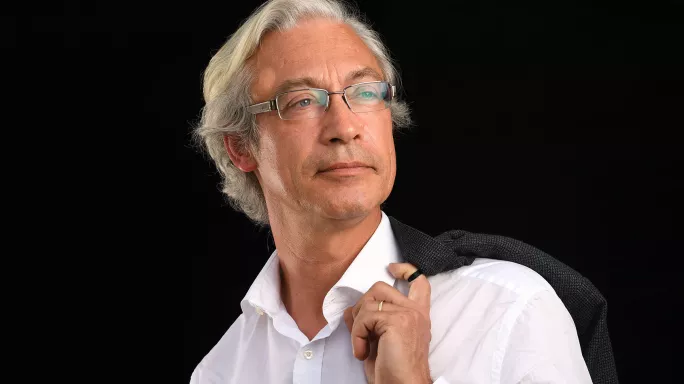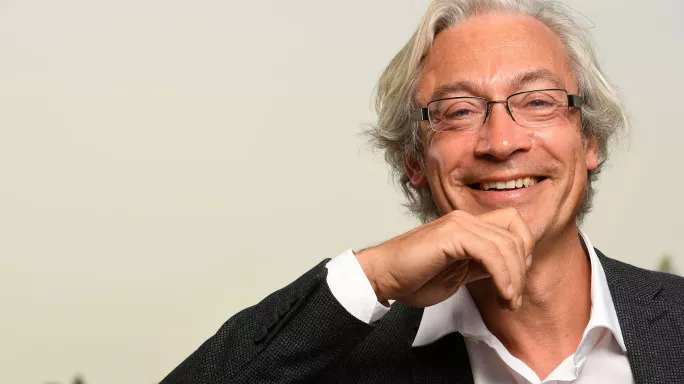- Home
- Meet the exams regulator who messed up his A levels
Meet the exams regulator who messed up his A levels

Roger Taylor is the chair of Ofqual. He also messed up his A levels.
“I did rather badly for various reasons,” he admits ruefully.
It was the familiar story. “Lack of application,” he says, chiding his younger self. “A sense of ‘What’s the point of it all?’ And also a sort of indecision about what I wanted to do.”
It’s an irony that an exam regulator didn’t prosper in his A levels. But since then, Taylor has spent his entire career grappling with the question of “How do you measure stuff?” Chairing England’s assessment watchdog - an appointment he has held since January 2017 - is a fitting place for him to have ended up.
Taylor chairs Ofqual at an important moment. While the heavy lifting to implement GCSE and A-level reforms might now have been accomplished, the impact of those changes on pupil wellbeing is under the spotlight as never before.
Searching questions are being asked of exams - existential questions, even. How relevant are GCSEs and A levels anymore? Do we still need them at all?
 Plato and Aristotle - not biology
Plato and Aristotle - not biology

Taylor grew up in Kent, winning a scholarship to the august private school The King’s School, Canterbury.
His father was a university academic. The cerebral Taylor has a slightly donnish air about him too, though this might have something to do with the luxuriant silver hair and spectacles creating a passing resemblance to AC Grayling.
There’s clearly a more freewheeling streak too. Like his namesakes in Queen and Duran Duran, he’s an avid musician who has “spent quite a lot of time playing in bands”. Unlike them, he’s a jazz pianist rather than a drummer.
Taylor says his schooling was “very traditional” - he took Latin and Greek at A level. “My father, who was a philosopher, believed that studying Plato and Aristotle was more important than studying biology,” he says. “I think he was mistaken in that belief,” he adds drily.
Ask Taylor whether it was a good education, and you quickly see the obsession with data, measurement, evidence. He doesn’t linger too long on the sentimental stuff. Yes, King’s was an “incredibly beautiful place”, and it was an “amazing privilege” to study “under the shadow” of Canterbury Cathedral. But before you know it, he’s questioning aloud whether private education is value for money.
“You are dealing with a very selective cohort of individuals,” he muses. “I would be really interested to see some evidence about the degree to which you actually get a higher quality of output for your money, compared to the same cohort going through state education.” While he’s sure some private schools are worth it, he’s “pretty convinced” many “charge quite a lot of money and really don’t deliver a significantly better education”. Taylor’s desire to analyse, quantify, measure - to find the signal within the noise - comes through.
Exams might have dealt Taylor a blow at A level, but it was an exam that granted him his reprieve. He was given a “second chance” by passing the Oxford University entrance exam. However, Taylor says he was “too young to really benefit” from university, and he found his time at Oxford “emotionally quite difficult”.
He only really hit his stride when he started in the world of work. After a brief foray into advertising, he joined the Consumers’ Association, the charity behind Which? “That’s where I really started to feel I knew where I was going in life,” he enthuses. He started getting interested in “How do you measure stuff? How do you enable people to know what is going on and to use information effectively? Which has really become the theme of pretty much everything I’ve done since.”

A multimillion-pound start-up
Taylor moved to work as a journalist at the Financial Times, covering first personal finance, and then business and technology reporting, including a stint in California. But he cut short his career as a journalist in 2000 to co-found Dr Foster, a health analytics firm. The company launched a Hospital Guide which became both immensely influential and controversial, comparing for the first time the mortality data for every hospital in the country. Predictably, it generated enormous media interest and pressure on hospitals to account for their figures, although the methodology used was questioned in some quarters. In 2006, the Department of Health purchased a 50 per cent stake for the tidy sum of £12 million, and the company was later sold to an Australian telecoms giant.
Taylor’s experience setting up Dr Foster gives him a good perspective on how health compares to education. He says doctors and nurses are “much more clear about the value of evidence and research in informing practice”, though he admits the nature of medicine means it is often easier to evaluate the impact of a given intervention. But he thinks things are “improving” in education, and is optimistic that teaching is becoming a profession which is “much more aware” of the importance of research.
While it might win on use of evidence, Taylor says the “struggle” between professions and the government over “who’s in charge of the service” has been less of a problem in education than in health. “A good example of that would be the reforms of the qualification system,” he says. While there have been “lots of viewpoints” on the changes, the teaching profession has worked “incredibly hard” to deliver the new qualifications and made the implementation a “really enormous success”, he says. “In healthcare, we’ve had sometimes a slightly more difficult political situation. It is all credit to teachers that they have got on and delivered this stuff.”
Some teachers - certainly the unions - would argue that education would be in a better state if it could rebuff politicians more effectively. Taylor has no truck with that view. “I don’t think it’s appropriate for professions to conduct, as it were, political resistance to the policies of the government. It’s fine for organisations that represent [teachers] to make their voices heard and to engage in that political debate, but at the end of the day we have a democratic system, and these are public services and that needs to be acknowledged.” That being said, he adds that “no reform programme will ultimately succeed unless it wins the support of the professions who have to deliver it”.
At Dr Foster, Taylor ran the rule over hospital data. So what does he think about accountability in education? “Measurement of anything, whether a treatment, a new drug, a hospital or a GP practice, a school or an individual pupil or an individual doctor…is always going to be controversial,” he says. “You can’t measure everything that is valued in these services, and so one of the areas of anxiety that arises is the feeling that because you’re not measuring everything, it’s unfair to measure the things that you can because they get over-weighted.” But this, he says, is “definitely not an argument” against measuring stuff.
There will inevitably be “trade-offs” to make. Sometimes, it makes sense to take an uncompromising approach. “There are moments when there is a standard that simply needs to be met…There will definitely be exceptions where meeting that standard does not produce the best result for an individual, but over a population it is producing significant benefits.” However, he says there are equally “many instances where you will lose more by taking that kind of hardline approach”. Above all, Taylor argues that accountability needs to be kept under constant review. “The performance regime itself is something that should be subject to a performance assessment.”
‘The more accurate an assessment is, the more stressful it will be’
One of the most serious accusations that has been levelled against our current assessment system is that higher-stakes exams have damaged pupils’ mental health. Taylor thinks that the causality is the other way round, with “rising levels” of underlying anxiety causing students to find it “more difficult” to deal with stressful episodes like exams. Some level of stress in exams is inescapable, he feels. Like a philosophy professor, he builds his argument from first principles.
“Education seems to me to imply a degree of assessment…to help the child, the child’s parents and other institutions involved in their subsequent education and employment to identify what they are good at…how they can make the right choices about their future life.” If assessment has to happen it needs to be “as fair as possible”, and “being fair means being accurate”. Accuracy in turn depends on “a degree of rigour”, which is where the stress comes in. “It’s inherently true that the more accurate an assessment is, the more stressful it will be,” Taylor says, completing the sequence.
He gives short shrift to claims that our linear exam system is intrinsically more stressful than what preceded it. “I’ve got two teenage kids who have just come out of the school system, and I assure you having to do a controlled assessment or having to produce a project work can be just as stressful as doing an exam. It very much depends on the individual.”
Taylor draws a distinction between “exam stress”, which he implies is healthy and normal in the right doses, and “debilitating anxiety”. Reflecting on his own experience, he says he didn’t find his A levels particularly stressful (“Perhaps an indication of why I didn’t do so well”), but he has experienced anxiety and clearly takes it seriously. “In my own personal life I have experienced [it] - not around exams - but where anxiety becomes paralysing. There’s a collapse of confidence. This is an extraordinarily damaging thing for young people.” He says Ofqual and the rest of the education system need to work to ensure this “simply does not occur”.

‘You cannot measure everything’
The exam system isn’t just under attack because of concerns about pupil welfare - the critique is more fundamental than that. There have been calls for GCSEs and A levels to be scrapped altogether. The charge has been led by Robert Halfon, the Conservative chair of the House of Commons Education Select Committee, who argues that the qualifications fail to recognise the skills young people will need in an increasingly automated and digital age. The merit of GCSEs has been questioned in particular now that young people have to stay in education or training until 18.
But Taylor is holding the line. Just because students no longer leave school after their GCSEs, it “doesn’t mean to me that the decisions young people make at 16…are any less consequential than they were when you could,” he says. There will be “decision points” throughout secondary school where assessment is needed to help young people decide what to do next. “You’re never going to get rid of that,” he believes, though it’s reasonable for people to debate whether 16 is “the right age”.
He isn’t buying the argument either that exams don’t test the correct things. Partly, he thinks the discussion has been mired in the skills versus knowledge debate, “an entirely pointless and theoretical distinction of no real value”. He argues that attributes like resilience and creativity “are in fact things that are well captured by existing qualifications”. “Learning how to remember stuff and pass an exam, learning how to write an essay, learning how to create a work of art, learning how to design, these are the mechanisms through which we can learn resilience, teamwork, creativity.”
Not that exams capture all the behaviours we want to teach young people. But Taylor’s point is that attempting to redesign them so they do is a fool’s errand. “You cannot measure everything, and it isn’t always helpful to try and measure it unless you have a good way of measuring it, because if you can’t measure it and you measure it badly, it can just create all the wrong incentives.”
As we stand on the threshold of the 2019 summer exam period, this could be Taylor’s last as Ofqual chair. His term comes to an end in December, and whether it gets extended is a decision for the education secretary. He says Ofqual is “an extremely competent organisation” that he has “enormously enjoyed chairing”, and he would be “very happy to continue doing so if that was felt to be a good idea”. “I also recognise it’s quite important to have turnover in these kind of organisations.”
What will he do with his time if he moves on?
Last year he was appointed chair of a new Centre for Data Ethics and Innovation, to advise the government on artificial intelligence. That will keep him busy. Besides that, he does mention he’s not currently in a band.
CV: Roger Taylor
Junior King’s, Canterbury
The King’s School, Canterbury
University of Oxford, BA (Hons) in Politics, Philosophy and Economics
London University, MA in Economics
1995-2000: Correspondent, Financial Times
2000-2015: Founder and director, Dr Foster
2013-14: National professional adviser, Care Quality Commission
2014-16: Founder and chair, Open Public Services Network at the RSA
2016-18: Consultant, data and digital, The Careers & Enterprise Company
2017-to date: Chair, Ofqual
2018-to date: Chair, Centre for Data Ethics and Innovation
Keep reading for just £1 per month
You've reached your limit of free articles this month. Subscribe for £1 per month for three months and get:
- Unlimited access to all Tes magazine content
- Exclusive subscriber-only stories
- Award-winning email newsletters



